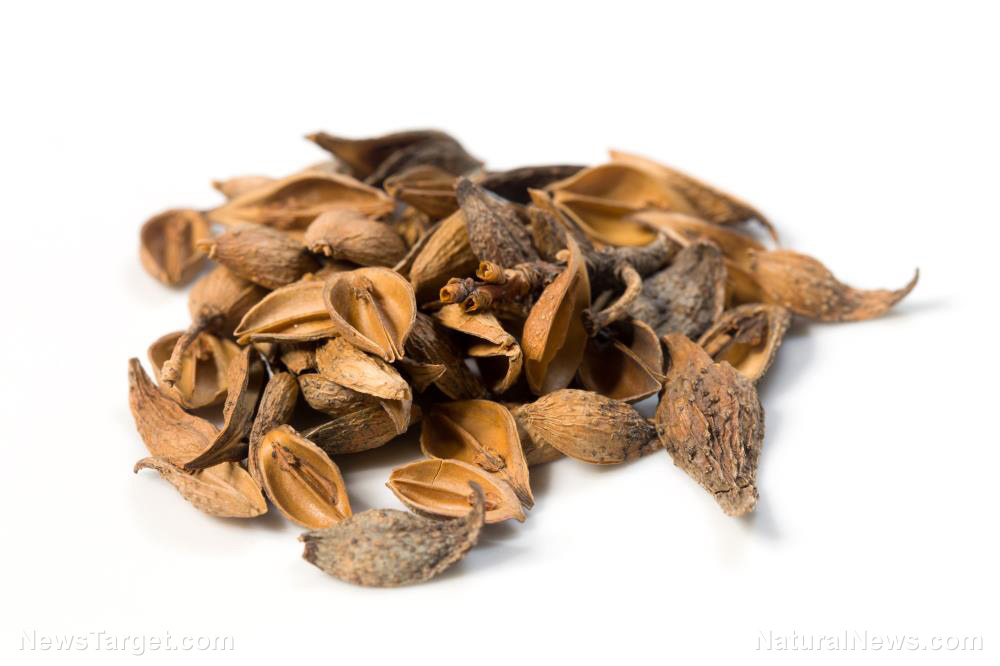Wikipedia: a web of deception
04/25/2019 / By News Editors

Wikipedia wants us to believe the entries in its “encyclopedia” are truthful, fair, and balanced. However, a comprehensive analysis of its nutritional articles reveals a plethora of factual inconsistencies and a clear and present bias against the very idea of nutritional supplementation. Even though almost every nutrient page admits most Americans don’t consume the Recommended Daily Allowance (RDA) of that particular vitamin or mineral, the pages’ editors still categorically discourage supplementation. Wikipedia’s main article on vitamins declares that supplements are “thought to be of little value in healthy people,”1 adding “no clear justification exists for recommending supplementation for preventing many diseases” with vitamin D, so much so that “further research of similar design is unneeded in these areas.”2 That certainly sounds final.
(Article by Helen Buyniski and Gary Null republished from PRN.fm)
Wikipedia would have you believe the science is 100% settled on nutritional supplements, but what are their qualifications for making such declarations? Attempts by qualified professionals with over 40 years of experience in the nutritional field to edit these articles to reflect accurate information are merely changed back in accordance with the beliefs of the core group of Skeptics who exercise an iron grip on Wikipedia’s health and nutritional pages. Editors, whose qualifications are lacking, are nevertheless given free rein to lead readers astray who might otherwise find information beneficial in their search for better health.
A thorough study of thousands of scientific articles in peer-reviewed literature suggests that the Skeptics controlling the flow of information aren’t telling us everything we need to know, whether about the negative effects of consuming too little or the benefits of supplementing with these nutrients. Wikipedia and its co-founder Jimmy Wales have much to answer for. Their insistence on replacing the truth with inaccurate, scientifically-reductionist Skepticism is contributing to global ignorance.
Here are just a few facts you won’t find in the Wikipedia entries for essential vitamins and minerals, randomly selected from hundreds of thousands of scientific research papers whose conclusions contradict those of the Wikipedia cognoscenti.
Vitamin A
The National Institutes of Health’s global database of peer-reviewed medical literature, PubMed, turns up 52,337 articles on vitamin A. A sampling of those articles indicates a wealth of beneficial effects associated with this micronutrient. The journal Nutrients discusses the positive effects of vitamin A on the immune system, extending to reduced mortality associated with diarrhea, measles, meningitis, and other illnesses endemic to third-world populations.3 The Journal of Molecular Neuroscience details multiple pathways of action for vitamin A for treating multiple sclerosis.4A Lancet study demonstrates reduced incidence of malaria among children treated with vitamin A supplementation in Papua New Guinea.5
Vitamin A also:
- Protects against night blindness6
- Protects against age-related macular degeneration7
- Aids in bone and tooth development8
- Has a protective effect against squamous cell carcinoma9
Vitamin B1 (Thiamine)
PubMed lists 16,004 studies on the effects of thiamine. Advances in Nutrition discusses thiamine’s role in protecting against dementia, along with the other B vitamins and in conjunction with vitamins C and E.10 Cardiovascular Drugs and Therapy recommends thiamine supplementation to improve outcomes in patients with heart failure.11 A study in Congestive Heart Failure links thiamine to improvements in cardiac function, weight loss, urine output, and the symptoms of heart failure.12 Case Reports in Neurological Medicine found a strong link between thiamine supplementation and improvements in cluster headaches.13
Thiamine also:
- Plays a central role in the production of RNA and DNA14
- Improves cognitive performance in individuals with Alzheimer’s15
- Reduces cell proliferation in breast cancer16
- Protects against pulmonary hypertension17
Vitamin B2 (Riboflavin)
PubMed reveals 17,529 articles concerning the effects of riboflavin. The substance has been shown to produce many health benefits. The publication Headache analyzes riboflavin’s action in modulating mitochondrial metabolic abnormalities, alleviating migraine symptoms and pointing toward classification of migraine as a mitochondrial disorder.18 The journal Electrophoresis demonstrates riboflavin’s ameliorative effect on muscle weakness linked to dysfunctional mitochondrial metabolism,19 and Aging magazine evaluated riboflavin’s potential in cancer therapy with DPI, which blocks mitochondrial respiration without permanently damaging the cells.20
Riboflavin also:
- Plays an integral role in cellular respiration and metabolism21
- Relieves oxidative stress and insulin resistance in diabetes22
- Protects against neurodegenerative and cardiovascular diseases23
- Protects against anemia and thyroid dysfunction24
Vitamin B3 (Niacin)
Niacin appears in the PubMed literature in 13,061 articles. A sampling of this research reveals widespread clinical benefits stemming from this nutrient. Biomedical Pharmacotherapy outlined the therapeutic benefits of niacin supplementation in alleviating oxidative stress and insulin resistance in diabetes.25 International Journal of Tryptophan Research outlines the role of niacin (as nicotinamide) in protecting neurons from traumatic injury, stroke, Alzheimer’s, Parkinson’s, and Huntington’s disease.26 The journal Nutrients details the use of high-dose niacin supplementation to successfully treat bipolar disorder.27
Niacin also:
- Protects against brain injury during cardiac arrest28
- Increases insulin sensitivity and moderates negative effects of high-fat diet29
- Maintains genetic stability and repairs DNA30
- Alleviates psychotic symptoms in schizophrenia31
Vitamin B5 (Pantothenic Acid)
Ever the naysayer, Wikipedia states that “although pantothenic acid supplementation is under preliminary research for a variety of human diseases, there is insufficient evidence to date that it has any effect.”32 However, there is an abundance of evidence – pantothenic acid is referenced in 3,347 articles on PubMed. Its effects are numerous, as it is the precursor to co-enzyme A, a biomolecule involved in over 70 enzymatic pathways. International Journal for Vitamin and Nutrition Research reveals that pantothenic acid (as calcium D-pantothenate) improves healing in flesh wounds.33 Vascular Health and Risk Management cites pantothenic acid (as pantethine)’s effectiveness in reducing cholesterol levels and other cardiovascular risk markers.34 Expert Review of Clinical Pharmacology describes the protective effects of pantothenic acid against valproic acid-induced hepatotoxicity linked to increased oxidative stress.35
Pantothenic Acid also:
- Plays a crucial role in the metabolism of fats and carbohydrates36
- Is integral to protein synthesis/amino acid catabolism37
- Protects against atherosclerosis38
- Ameliorates oxidative stress in radiation damage39
Vitamin B6 (Pyridoxine)
Pyridoxine is mentioned in 9,893 articles on PubMed. The substance has numerous beneficial effects across human cellular systems. The journal Cellular and Molecular Biology illuminates pyridoxine’s protective effects against Alzheimer’s disease, citing the vitamin’s antioxidant property as the active mechanism.40 Anticancer Research shows pyridoxine’s potential role in treating malignant melanoma.41 Food and Chemical Toxicology demonstrates pyridoxine’s protective effect against acetaminophen-induced hepatotoxicity, enacted through suppression of oxidative stress and induction of antioxidant enzymes.42
Pyridoxine also:
- Is an essential component of amino acids, carbohydrates, and lipids43
- Relieves morning sickness in pregnant women44
- Plays a role in neurotransmitter synthesis and hemoglobin formation45
- Protects against seizures, migraine, chronic pain, and depression46
Vitamin B7 (Biotin)
“Biotin is often recommended as a dietary supplement for strengthening hair and nails, though scientific data supporting these outcomes are weak,” says Wikipedia.47 Not quite – biotin is referenced in 31,208 articles on PubMed, which show systemic benefits extending far beyond hair and nails. The journal Cutis describes a marked improvement in nail health among subjects taking biotin supplements.48 Journal of Nutritional Biochemistry outlines biotin’s potential in treating diabetes, hyperglycemia, and hyperlipidemia based upon its improvement of glucose tolerance and promotion of glucose and lipid homeostasis.49 Multiple Sclerosis reveals that high-dose biotin supplementation produces sustained reversal of multiple sclerosis.50
Biotin also:
- Influences the mediation of gene expression51
- Plays a key role in cell metabolism, growth, and differentiation52
- Shows potential as a gene-based cancer therapy and delivery system53
- Regulates immunological and inflammatory functions54
Vitamin B9 (Folate)
PubMed lists 56,178 studies that mention folate. The benefits of Folate supplementation are so well known that over 50 countries fortify certain foods with the nutrient to ensure adequate consumption by their population. American Journal of Clinical Nutrition reveals a decreased breast cancer risk associated with higher folate intake in postmenopausal women.55 Journal of Gastroenterology and Hepatology similarly finds a decreased risk of esophageal and pancreatic cancers associated with folate consumption.56 Biotechnic and Histochemistry shows that folic acid supplementation mitigates the toxic effects of bisphenol-A in testes.57
Folate also:
- Prevents neural tube defects in utero when taken during early pregnancy58
- Decreases risk of stroke and cardiovascular disease59
- Promotes wound healing60
- Is integral to cell division and growth, particularly during infancy and pregnancy61
Vitamin B12
PubMed lists 30,510 studies mentioning vitamin B12. Supplementation is mandated in vegans and vegetarians because B12 is only found in animal proteins. Nevertheless, the literature is full of side benefits to such supplementation. The Journal of the Neurological Sciences shows that B12 supplementation has a protective effect against multiple sclerosis progression.62 Maternal and Child Health Journal finds that maternal vitamin B12 supplementation leads to higher expressive language scores in children at 30 months.63 Diabetes Care suggested vitamin B12 supplementation improved outcomes for elderly diabetic individuals presenting with neuropathy and posited oxidative stress as the culprit in declining B12 levels.64
Vitamin B12 also:
- Plays a central role in myelin formation65
- Protects against pernicious anemia and associated psychiatric symptoms66
- Reduces oxidative stress and lessens its negative effects on the nervous system67
- Protects against Alzheimer’s and vascular dementia68
Vitamin C
There are 65,550 articles on vitamin C on PubMed. Picking out a few of these reveals a wide range of health benefits associated with the substance. The journal Nutrients discusses the well-known role of vitamin C supplementation in preventing and lessening the duration of the common cold (which Wikipedia denies).69 The European Journal of Cell Biology discusses vitamin C (as L-ascorbate)’s cancer-fighting properties, specifically in colorectal cancer.70 Wikipedia categorically denies any anti-cancer effects in the nutrient, dismissing the reams of studies in the scientific literature as “observational and uncontrolled studies.” CNS Neuroscience and Therapeutics analyzes vitamin C’s antioxidant actions in the central nervous system and how these processes inhibit the onset of neurodegenerative diseases like Alzheimer’s and Parkinson’s.71
Vitamin C also:
- Plays a central role in immune system function72
- Prevents scurvy73
- Indicates promise as a non-toxic cancer treatment74
- Facilitates iron absorption75
Vitamin D
There are 77,269 articles on vitamin D available on PubMed, making it the most studied vitamin. Just a glimpse at the literature shows numerous benefits associated with this micronutrient. American Journal of Public Health surveys decades of studies, revealing a strong correlation between vitamin D and its metabolites with reduced risk and decreased mortality from colorectal, breast, prostate, and ovarian cancers.76 The British Journal of Psychiatry discusses the positive effects of vitamin D supplementation on depressed patients.77 Nutritional Neuroscience illuminates the link between low serum levels of vitamin D and autism spectrum disorder, then demonstrates that vitamin D supplementation leads to improvement on behavioral and language metrics in children with ASD.78
Vitamin D also:
- Protects against development of multiple sclerosis (and ameliorates symptoms in patients with MS)79
- Strengthens bones and protects against osteoporosis/osteomalacia80
- Protects against development of type I diabetes; increases insulin sensitivity in type II diabetes81
- Improves cardiac function post-myocardial infarction82
Vitamin E
Wikipedia states, “Population studies suggested that people who consumed foods with more vitamin E, or who chose on their own to consume a Vitamin E dietary supplement, had lower incidence of cardiovascular diseases, cancer, dementia, and other diseases, but placebo-controlled clinical trials could not always replicate these findings.”83 Never satisfied with anything less than perfect replication, the Skeptic editors overlook the 41,453 studies referencing vitamin E in PubMed on their elusive quest for the perfect clinical trial. Nutrients, in a comprehensive survey of studies on the subject, points to the beneficial effects of vitamin E supplementation on Alzheimer’s disease and dementia, suggesting the mechanism of action extends beyond its antioxidant capabilities to its role in signaling, membrane fluidity and gene regulation.84 The International Journal for Vitamin and Nutrition Research discusses the neuroprotective capabilities of vitamin E against glutamate cytotoxicity in neuronal cells.85 Atherosclerosis reveals that vitamin E supplementation is effective in reducing mortality and atherosclerosis only when subjects consume a low-fat, low-cholesterol diet – subjects consuming the Standard American Diet had no such luck.86
Vitamin E also:
- Regulates enzyme activity and gene expression87
- Shows promise (as tocotrienol) as a non-toxic anticancer treatment88
- Lowers cholesterol89
- Protects against neurodegeneration90
Vitamin K
Vitamin K is referenced in 24,421 studies on PubMed, but none of those studies are good enough for Wikipedia, which states that “vitamin K has been promoted in supplement form with claims it can slow tumor growth; however, no good medical evidence supports such claims.”91 Archives of Physiology and Biochemistry shows beneficial effects from high-dose vitamin K supplementation (in combination with Calcium) in treatment of liver cancer.92 Pol Merkur Lekarski recommends a constant concentration of vitamin K in the diet to prevent complications arising from continued dosage of hydroxycoumarin derivatives. 93The medical journal Biofactors details the role of vitamin K in synthesizing sphingolipids, a class of structural lipids that in addition to shaping brain cell membranes also play a significant part in proliferation, differentiation, cell-cell interactions, and senescence.94
Vitamin K also:
- Is needed to synthesize proteins involved in blood clotting95
- Plays a key role in cognition and behavior96
- Slows the development of soft tissue calcification in uremia97
- Prevents vascular calcification98
Calcium
Wikipedia calls calcium supplementation “controversial” but admits that since 2010, the FDA has permitted the health claim that calcium and vitamin D supplements together protect against osteoporosis. Qualified health claims regarding the mineral’s effectiveness in reducing the risks of colon cancer and hypertension are also permitted.99 A PubMed search yields 563,919 results for calcium and the nutrient is ubiquitous in bodily processes. European Journal of Nutrition confirms calcium’s effectiveness in improving bone mineral density in teenage girls.100 Public Health Nutrition adds that in addition to its preventive benefits against the disease, calcium reduces the rate of bone loss in patients who already have osteoporosis.101 New England Journal of Medicinefinds calcium supplementation reduces the risk of recurrent colorectal adenomas.102
Calcium also:
- Plays a central role in blood cell synthesis103
- Protects against stroke, especially in conjunction with magnesium and potassium104
- Contributes to bone growth and development105
- Lowers blood cholesterol106
Copper
Copper is mentioned in 118,869 studies on PubMed. Metallomics discusses copper’s possible role in treating cancer as an alternative to platinum-based chemotherapy drugs.107 The journal Nutricion Hospitalaria finds a significant protective role for copper against cognitive and physical disabilities in the elderly obese.108 Drug and Chemical Toxicology shows the protective antioxidant effects of copper (in combination with nicotinate) on the kidneys in the presence of glycerol.109
Copper also:
- Protects against anemia110
- Plays a key role in neurotransmitter synthesis111
- Shows strong potential in chelation treatment for neurodegenerative disorders112
Iodine
Iodine appears in 112,753 studies on PubMed. Nationwide insufficient iodine was once considered such a serious problem that the mineral was added to table salt, and iodine deficiency remains the leading cause of preventable mental retardation in the world today, even in developed nations. But don’t look towards Wikipedia to recommend an iodine supplement. Journal of Nutritional Biochemistry finds that iodine supplementation in utero improves motor coordination in offspring.113 Molecular Medicine discusses iodine’s antitumor effects on several cancers, including prostate.114
Iodine also:
- Is required for synthesis of thyroid hormones115
- Plays a central role in fetal brain development116
- Prevents goiter117
- Protects against cognitive decline in the elderly118
Iron
A PubMed search yields 200891 studies referencing iron. Because the mineral is so important to sustaining life, and because iron deficiency is the world’s most common mineral deficiency, many foods are already fortified with iron. Supplementation is another means of ensuring adequate iron consumption. Lakartidningen notes iron supplementation is used to treat inflammatory bowel disease.119
Iron also:
- Prevents anemia120
- Is required for the production of red blood cells121
- Has anti-inflammatory properties122
Magnesium
Magnesium is referenced in 102,117 studies on PubMed. Given that the mineral is required for the catalytic action of over 300 enzymes, its effects are extensive across all bodily systems. The journal Diabetes Care finds that magnesium supplementation improved insulin response and glucose handling in elderly and non-insulin-dependent diabetics. The journal Diabetes Care reveals that magnesium supplementation protects against the development of Type II Diabetes in men and women, particularly in overweight individuals.123 Stroke journal discusses the benefits of magnesium supplementation in treating eclampsia and preeclampsia,124 while Nutrients finds higher magnesium intake correlates with lower risk of coronary heart disease.125
Magnesium also:
- Has a beneficial effect on migraine126
- Protects against high blood pressure127
- Plays crucial role in DNA and RNA synthesis128
- Has beneficial effect on depression and anxiety129
Potassium
Potassium appears in 251,138 studies in PubMed. Even Wikipedia admits that half of Americans do not meet potassium’s RDA requirement,130 and the article refrains from the site’s usual blanket dismissal of supplementation. Journal of Hypertension reveals significant benefits of potassium supplementation in treating hypertension.131
Potassium also:
- Maintains fluid and electrolyte balance132
- Plays an important role in hormone secretion and regulation133
- Normalizes heart rhythms134
- Governs muscle contraction135
Selenium
While Wikipedia cautions that “selenium supplementation has not succeeded in reducing the incidence of any disease, nor has a meta-analysis of such selenium supplementation studies detected a decrease in overall mortality,”136 selenium appears in 32,412 studies in PubMed, many of which would beg to differ. Mechanisms of Aging and Development outlines selenium’s protective effect against the onset of age-associated neurodegenerative disorders such as Parkinson’s, Alzheimer’s, and epilepsy.137 American Journal of Physiology discusses selenium’s beneficial effects on inflammatory bowel disease (IBD).138 Biological Trace Element Research outlines selenium’s role in protecting against malignant gliomas, both independently and alongside traditional chemotherapies.139
Selenium also:
- Plays an important role in initiating and regulating immune responses140
- Modulates inflammation and maintains gut homeostasis141
- Demonstrates positive effect on liver, prostate, colorectal and lung cancers142
- Reduces mortality in patients with septic shock143
Zinc
Zinc is referenced in 136,705 PubMed articles. The American Journal of Clinical Nutrition shows that zinc supplementation is correlated with better skin healing outcomes in burn patients.144Another study in American Journal of Clinical Nutrition demonstrates that zinc supplementation is beneficial in improving immune function in the elderly, specifically T cell function.145 The prestigious journal Pediatrics shows zinc supplementation reduces the incidence and recurrence of severe diarrhea in children.146 Behavioral Brain Research indicates that zinc supplementation has a positive effect on cognitive performance, specifically in short- and long-term recognition memory and spatial working memory.147
Zinc also:
- Lessens severity and duration of pneumonia148
- Shortens the duration of the common cold149
- Improves glycemic control in Type II Diabetes150
This does not represent an exhaustive list of vitamins and minerals, merely a sampling of nutrients where the scientific literature sharply contradicts Wikipedia’s claims regarding the uselessness of nutritional supplements. Wikipedia presents itself as the final authority on nutrition with its entries. However, hundreds of thousands of studies suggest that not only are most Americans deficient in many of these nutrients but that healthy individuals can also benefit from supplementing their intake. What responsibility do the ultra-Skeptic Wikipedia editors bear for discouraging readers from taking supplements that could markedly improve their health and quality of life? Why are they so determined to discourage the consumption of nutritional supplements? Why are nutritional supplements held to a higher standard of proof than other scientific theories and particularly pharmaceutical drugs, which go unmolested in Wikipedia’s pages despite less research backing them up?
In general, adults consuming a Standard American Diet take in markedly less than the RDA of the essential vitamins and minerals even as they consume too many calories overall. They thereby put themselves at greater risk of cellular weakness and disease, depending on which nutrients they lack. Even the adequacy of RDA-level consumption as a national standard for nutrition is questionable. Many European countries recommend higher levels of the essential nutrients for optimal health. Supplementation is a cheap and easy way to make up for dietary deficiencies, avoiding negative health repercussions and maximizing the benefits of these essential nutrients. By discouraging such an inexpensive and sensible route to mental and physical health, the arch-Skeptic editors on Wikipedia are leading readers astray. They must answer for their inaccurate presentation of the nutritional landscape and the repercussions it has for readers’ health.
The single most important factor in evaluating the nutritional science is how the information is used. Clinicians, doctors, nurses and other medical professionals are using the information contained in these thousands of scientific studies to treat patients – to improve their health and improve their lives by integrating nutritional supplements into their practices. Wikipedia and Jimmy Wales are doing nothing of the sort. To deny the benefits of clinical experience is to deny the basis of all treatment programs. Wikipedia and Jimmy Wales’ scientific-reductionist edifice is based on no qualifications, no experience, and no real-world application of the knowledge they claim to possess, and this is the Achilles’ heel of the skeptic approach. Discounting the clinical real-life experience of experienced medical professionals in favor of unfounded assertions from individuals who have never attempted to apply their opinions in the field shows the worst kind of bias.
Read more at: PRN.fm
Tagged Under: alternative medicine, bias, Big Pharma, Big Tech, Collusion, corruption, deception, disinfo, Fact Check, fake news, Glitch, health, Jimmy Wales, lies, natural medicine, propaganda, quackery, skeptics, tech giants, Wikipedia, Wikipedia scam
RECENT NEWS & ARTICLES
COPYRIGHT © 2017 ALTERNATIVE MEDICINE NEWS




















